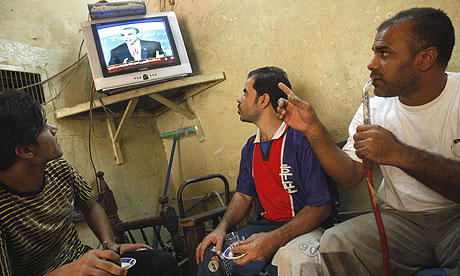 You're wrong Makheru. Barack is tougher than all these fools. He is what JayZ would be if he were a politician. He is beating white boys at their own game. You're wrong Makheru. Barack is tougher than all these fools. He is what JayZ would be if he were a politician. He is beating white boys at their own game.
Unfortunately, you and many others wouldn't be happy unless Barack said "fuck all y'all" and proclaimed his uncompromised support for Jeremiah Wright, reparations, and mass transfers of wealth. Your criticism is misguided in substance. What you wish to happen is, by definition, revolution. To work and succeed within the political system requires the maneuvers made by Obama.
You may call him soft or weak but I got much the same comments while growing up in Jamaica, Queens if I read a comic or novel on the bus. In the final reckoning I was a young resident in charge of the ER when I saw the fellow working in housekeeping.
Barack will be your next POTUS. He will make the same concessions and retreats as his predecessors(remember Reagan's response after Beirut or G.W. afetr Tbilisi?). He will commit similar treacherous acts at home and abroad.
If you think all our past presidents are waffles then fine. But if you would try to make Obama something uniquely compliant than you are verifiably wrong. JFK, his most similar counterpart in my estimation, reluctantly made LBJ, a man he and Bobby outright hated, his VP. JFK openly stated that if he followed his desire for detente with the USSR that the JCOS would lead a coup against him.
Another thing. White people aren't tough. They're just mean brutes. Tough isn't shooting mooses, chopping trees or chewing tobacco. It certainly isn't going out buying guns days before the election. Nor is it the pugnacity of your more sincere racists. That's a cover for anxiety. And Craig's favorite white boy led off with it.
|  White boys are just so weak and insecure. Never seen a tough one in my entire life.-- Doc Sub White boys are just so weak and insecure. Never seen a tough one in my entire life.-- Doc Sub
Dr. Sub, I assume you must have lived a sheltered life. While moving around Dixie I’ve met a lot of white men who are as tough as nails. I’ve had confrontations with these people; I’ve worked side by side with them, sawing down trees and splitting wood, and I’ve rubbed elbows with them in their bars.
I’ve faced these people eye to eye and deep down inside, they respect strong Black men. They would never respect a waffling waffle like Barack Obama, who has no sense of loyalty to anything other than his political career.
[Brad, 42, and Margaret Marcus, 47, who were at a Fairfax County shooting range recently with their two children for weekly target practice, said they sped up the purchase of two semiautomatic rifles that had been banned during the Clinton administration because they feared they could become illegal again if Obama wins. The couple, who run an online retailing business from their Ashburn home, said they viewed Obama's remarks about protecting the Second Amendment as campaign trail "pandering."]
Personally, I’d rather deal with a redneck, raw-bone Dixie cracker any day, than those back-stabbing paternalistic white liberal elites who support Obama.
|




















